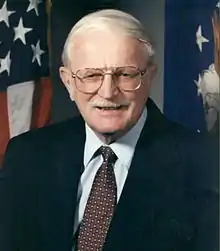Clark G. Fiester
Clark George Fiester (1934–1995) was an American businessman who served as Assistant Secretary of the Air Force (Acquisition) from 1993 until his death in a plane crash in 1995.
Clark G. Fiester | |
|---|---|
 | |
| Assistant Secretary of the Air Force (Acquisition) | |
| In office May 1994 – April 17, 1995 | |
| President | Bill Clinton |
| Preceded by | Darleen A. Druyun (Acting) |
| Succeeded by | Darleen A. Druyun (Acting) |
| Personal details | |
| Born | Clark George Fiester |
| Education | Pennsylvania State University (B.Sc.) Stanford University (M.Sc.) |
Biography
Clark G. Fiester was born on January 25, 1934.[1] He was educated at Pennsylvania State University (B.S.) and Stanford University (M.S.).[2] He later attended a six-week Advanced Management Program at Harvard Business School.[2] He served in the United States Air Force and became a captain.
In 1957, Fiester joined GTE Government Systems Corp. (which would be acquired by General Dynamics in 1999), a company that designed and developed information security, electro-optics, and automated airport weather stations.[2] Fiester was associated with GTE Government Systems Corp. for his entire career, eventually becoming a group vice president and general manager.[2]
On November 1, 1993, President of the United States Bill Clinton nominated Fiester to be Assistant Secretary of the Air Force (Acquisition), and he subsequently held office until his death.[2] Fiester had been a long-time friend of United States Secretary of Defense William Perry, the two having met as undergraduates at Penn State.[3]
Fiester died in a plane crash near Alexander City, Alabama on April 17, 1995.[3] He had been flying on an Air Force Learjet 35 from Andrews Air Force Base to Randolph Air Force Base when the crash occurred.[3] Also killed in the crash were Colonel Jack Clark II, Fiester's military deputy; Major General Glenn A. Profitt II; and five other members of the Air Force.[3] President Clinton granted a presidential waiver to allow Fiester to be buried in Arlington National Cemetery.[3]
References
- Find-a-Grave Profile
- ""Air Force Officials Named", November 1, 1993". Archived from the original on 2011-07-21. Retrieved 2011-02-27.
- Memorial Page from Arlington National Cemetery